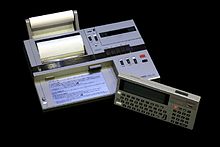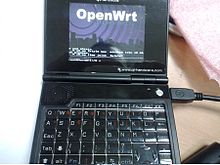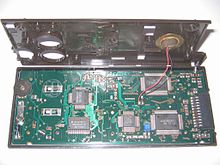- Pocket Computer
-
Pocket Computer (oder auch Taschencomputer) war eine Bezeichnung für BASIC programmierbare graphikfähige Kleincomputer, welche Anfang der 80er Jahre auf den Markt gebracht wurden.
Inhaltsverzeichnis
Geschichte
Im Jahre 1977 brachte Sharp mit dem PC-1201 seinen ersten programmierbaren Taschenrechner unter der Bezeichnung POCKET COMPUTER auf den Markt. Mit dem Modell EL 5100 folgte ein programmierbarer Taschenrechner im Quer-Format (2½"×7"×½" EL 5100). Diese Bauform ermöglichte ein einzeiliges LC-Display mit erstmals 24 Zeichen, als weitere Innovation, Platz für (zehn) „ABC“ Tasten. Mit dem PC-1211 folgte eine QWERTZ Tastatur. So gilt der Sharp PC-1211, eingeführt im Jahre 1980, heute als erster Pocket Computer.
Bis zu diesem Zeitpunkt waren die 'Sprachen' der programmierbaren Taschenrechner (zum Beispiel TI-59) stets hersteller- beziehungsweise modellgebunden, Pocket Computer konnten erstmals herstellerunabhängig Programme verarbeiten, welche in der damals sehr populären Programmiersprache BASIC erstellt waren.
Zur Markteinführung gegen Ende 1980 waren diese Rechner durch den niedrigen Einstiegspreis (ab ca. 330 DM) und die gute Verfügbarkeit (die Geräte konnten z.B. im Versandhandel bei Quelle bestellt werden) auch eine preisgünstige Alternative für Computereinsteiger.
Typische Technische Daten (1980)
- RAM: 0,9 KB bis 1,9 KB (PC-1211)
- ROM: 11 KB
- CPU: 256 kHz / 4 bit
- Anzeige: 24-stellige Punktmatrixanzeige in LCD-Technik (5×7-Matrix), über die Zahlen, Großbuchstaben und Sonderzeichen dargestellt werden können, jedoch keine Grafik. Berechnungen werden mit maximal zehnstelliger Mantisse und zweistelligem Exponent dargestellt.
- Ton: piezoelektrischer Summer für einfache Signaltöne, ansprechbar über den BASIC-Befehl 'BEEP'
- Tastatur: QWERTY-Tastatur sowie Zehnerblock und Sonderfunktionstasten
- Stromversorgung: 5,4 Volt Gleichstrom über vier Quecksilberoxid-Zink-Batterien vom Typ MR-44 für eine Betriebsdauer von etwa 300 Stunden.
- Preis (1980) ab ca. 330 DM
Liste von Pocket Computern
Hersteller Modelle Casio FX-700P, FX-702P, FX-710P, FX-720P, FX-730P, FX-750P, FX-785P, FX-790P, FX-795P, FX-802P, FX-820P, FX-840P, FX-850P, FX-880P, FX-890P, PB-80, PB-100, PB-500F, PB-770, PB-1000 Elektronika MK 85, MK-85M, MK-90, MK-95, MK-98 Hewlett-Packard HP-75C, HP-71B Kikuichi PC-A10, PC-A2 Nixdorf Computer LK 3000 Olympia Business Systems OL-H004 Panasonic RL-H1400 HHC (auch verkauft als Quasar HK-2600TE), RL-H1800 HHC Qi hardware Ben NanoNote Sharp PC-1210 & 1211, PC-1246S, PC-1500, PC-1430, PC-1401, PC-1403, PC-1405G, PC-1280, PC-1350, PC-1360, PC-1460, PC-1475, PC-E500(S) Tandy Pocket Computer range Texas Instruments TI-59, TI-74, TI-74S Toshiba IHC-8000 system Literatur
- Lawatsch, Peter: Anwendungshandbuch zum CASIO FX-850P, Fischel-Verlag, Berlin 1989, ISBN 3-89374-000-7
- Lawatsch, Peter: Der CASIO FX-850 P in deiner Hand, Fischel-Verlag, Berlin 1989, ISBN 3-89374-020-1
- Fries, N.: Das CASIO FX 850/880P Power-Buch, Eigen-Verlag, Neuss 2011
Weblinks
- www.lehmayr.de – Simons Pocket Computer Ressourcen
- www.pocketmuseum.com – The pocket computer museum
- WebSite über Casio computer bei www.ledudu.com (englisch)
- Sharp Pocket Computer Museum bei www.westhaeuser.de
- Umfangreiche Sammlung von Pocket-Computern auf der Website von Manfred Becker
Wikimedia Foundation.





